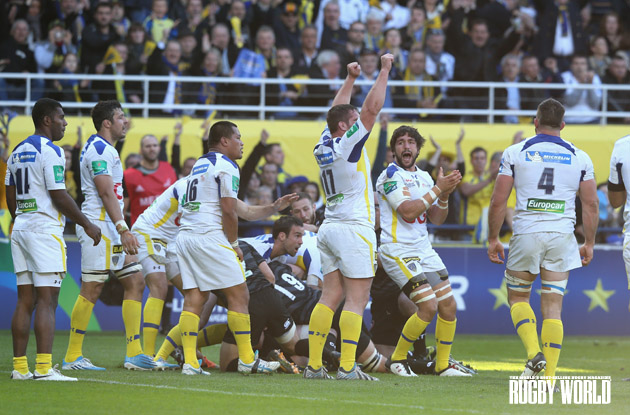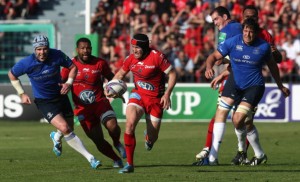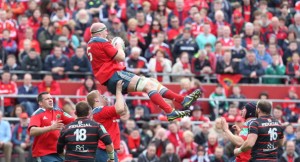Four enthralling matches over two days reinforced one thing robustly – the Heineken Cup (in its current form) is going out with a big old bang. Here’s a run-down of five lessons we learned from an absorbing set of quarter-finals.
The statistic doing the rounds last week was that exactly one in four quarter-finals in the Heineken Cup’s 19-season history had resulted in victory for the away side. That ratio remains intact, and the influence of the respective venues was a significant facet during each of these quarters.
Munster rode a tsunamni of Thomond emotion to dispatch Toulouse. Clermont extended their amazing record at stronghold Stade Marcel Michelin. Toulon’s fanatic supporters were rewarded with a convincing triumph over Leinster. In each contest, ardent support and cacophonous noise made life tough for the visiting opponents.
Though Ulster ended up on the wrong side of an extremely tight result against Saracens, Ravenhill was the most raucous of all. Jared Payne’s early red card gave home fans a cause to rally behind and their heroes responded, defying a numerical disadvantage to secure 57 per cent possession and 55 per cent territory over the Aviva Premiership leaders. It was a brave attempt, made possible by the tribal atmosphere.
Two ways to bow out
Ulster’s overall display was no less courageous for the final result. In fact, Mark Anscombe should be unflinchingly proud of his charges and their collective commitment. They took Saracens to a dark place on Saturday night. Likewise, driven by Tom Youngs’ rallying cry at the break, Leicester scrapped for their lives. They made 95 tackles to Clermont’s 51 – and still ended up with a better success rate.
The same cannot be said of the other two quarter-final losers. At times Toulouse looked as if they would rather be at the bar, while Leinster’s challenge subsided in a flurry of errors – 26 missed tackles and 13 turnovers all told. Frankly, there was a worrying dearth of ambition in attack too.
After suffering an excruciating loss to his former employers, Tigers boss Richard Cockerill explained that he had asked his players to give everything. That way, they would regret nothing. Sadly, Toulouse and Leinster might look back on their exits in anger.
Who needs caps?
Schalk Brits and Steffon Armitage were the stand-out figures of the entire weekend. While they carried out bread-and-butter roles at set-piece and breakdown accurately, their pace and penetration with ball in hand was nothing short of freakish. Neither Ulster nor Leinster could live with them. It seems absurd that such a gifted pair of players possess a combined total of ten Test appearances. But there are logical reasons.
Brits’ competition for a Sprinbok berth at hooker over his career has comprised of John Smit, Bismarck du Plessis and Adriaan Strauss – a special trio. At 28, Armitage junior has time on his side. However, Stuart Lancaster has an understandable policy of selecting from the Aviva Premiership. Would Toulon’s pocket rocket give up the considerable financial and lifestyle benefits of the Top 14? Who knows?
Their respective performances – not to mention that of Leicester’s precocious uncapped Welsh fly-half Owen Williams – demonstrated the autonomy of the Heineken Cup. For 80 minutes, international reputations are cast aside. The playing field is always level. It’s fascinating.
Decisions, decisions
Show me a spectator who says they have never questioned a referee’s call. Then I’ll show you a liar. Passions run high in the Heineken Cup, and tempers often fray. As such, officials are subjected to heightened scrutiny and – inevitably – a bit more vitriol.
Alain Rolland and Jerome Garces regularly divide opinion. This weekend was no different. Rolland ended Leicester’s challenge by awarding Clermont a dubious ruck penalty, while Garces boldly dismissed Payne to render Ulster’s task excruciatingly tough. By contrast, Wayne Barnes (Toulon v Leinster) and Nigel Owens (Munster v Toulouse) had relatively quiet outings. Not everybody was happy though. They never are.
Rugby’s law book is a complex, ever-evolving organism that is eternally open to interpretation. That can be infuriating. But it’s never boring. When the stakes are high, it’s crucial to remember that referees are both human and trying their damndest to do a good job. It can be difficult, but respect for them is one of rugby’s cornerstones that should never be endangered. Besides, what would we all talk about if they always got things right?
A familiar four
And then there was a quartet. The same four that fought it out at the semi-final stage last season, albeit in a different combination. Once more Munster jump over The Channel, this time to face Toulon. Saracens defend Twickenham again too, dragging Clermont away from the Marcel Michelin, where they look invincible.
The Top 14 heavyweights are favourites to reach another final, and possess unparalleled power up front. Nothing is guaranteed in this glorious competition, though. April 26 cannot come soon enough.









